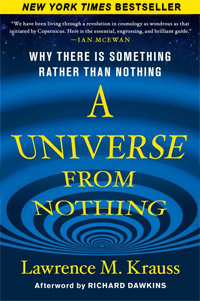
Quantum Time
May 4, 2012
Gene Therapy Advances
July 29, 2012There is a surprisingly unskeptical review in eSkeptic of Lawrence Krauss’s A Universe from Nothing.
As an atheist I applaud Krauss’s intent to address attempts to prove the existence of a God by the “well, where did the Universe come from, huh?” argument. However his attempt to do so by arguing that science supports the notion that the universe popped out of literally nothing is replacing bad philosophy (theism) by worse philosophy (the very poor philosophies that bred by quantum physics – not that there is anything wrong with quantum physics, just the weird philosophical interpretations people like to impose upon it).
Here is the rub:
“I think it is virtually certain that everything we see came from empty space,” Krauss exposited. “And all the physics I know is highly suggestive that our universe popped into existence as a quantum fluctuation.” The book develops this by explaining that because of the laws of quantum mechanics and special relativity, empty space consisted of a bubbling brew of virtual particles spontaneously popping in and out of existence on timescales too small to notice. (It is this behavior that makes them virtual.) This was the “nothing” out of which the universe arose. These bubbling activities, known as quantum fluctuations, caused a mass density fluctuation which, in combination with the process of cosmological Inflation, resulted in the Big Bang.
The obvious question to the claim that the universe popped into existence as a quantum fluctuation is: a quantum fluctuation in what? The theory presupposes the existence of some kind of substratum, and not only that, one subject to the existence and laws of quantum mechanics. Logically, it cannot “solve” the question of how the universe can exist without a creator.
As I have argued elsewhere, the existence of the Universe is no argument for any god, let alone any specific God. So attempting to answer it by introducing the invalid notion of a whole universe popping out of nothing is not even necessary. (I have written more on the topic of where a rational philosophy can and should guide scientific theory in Philosophy and Science).
To paraphrase King Lear: “Nothing will come of nothing. Speak again, lest you mar your philosophy.”





